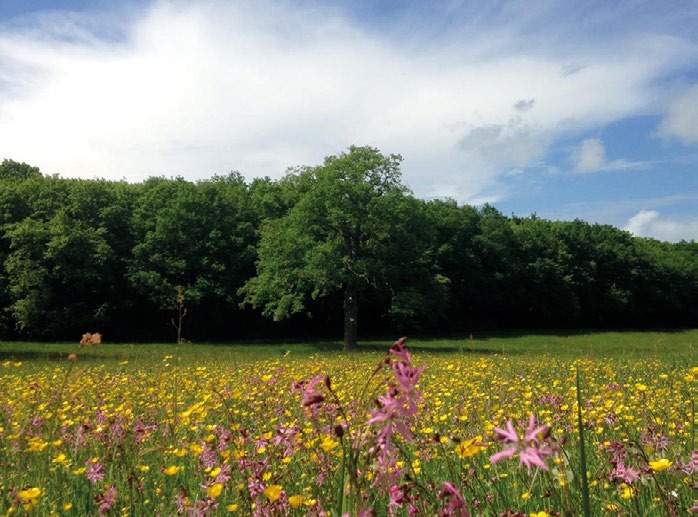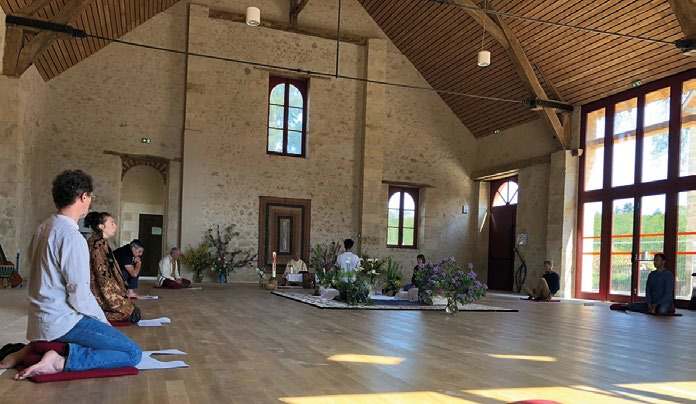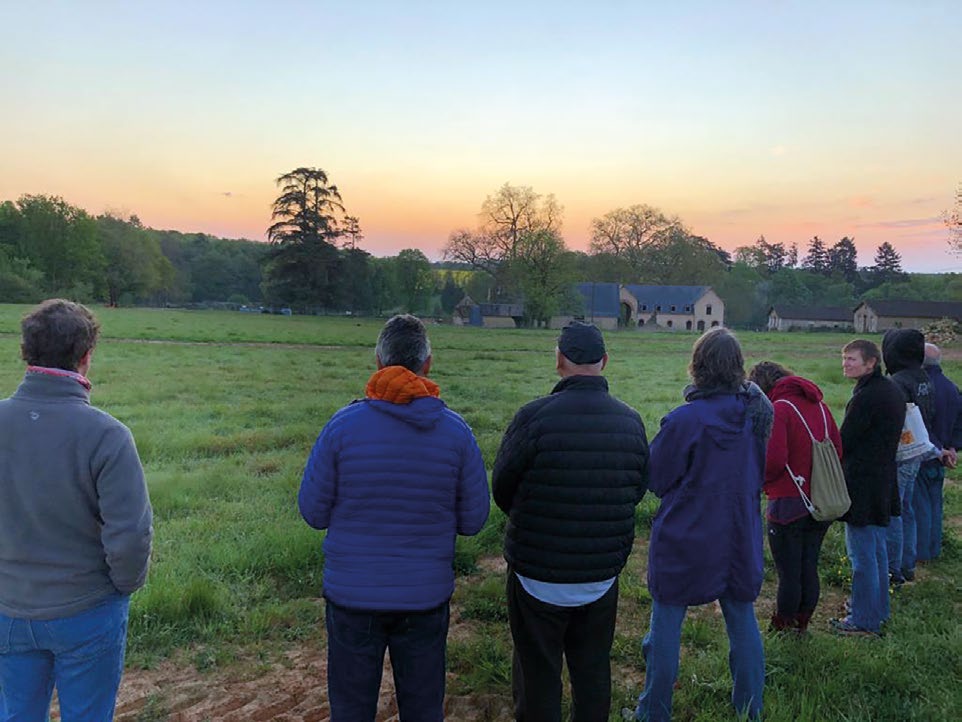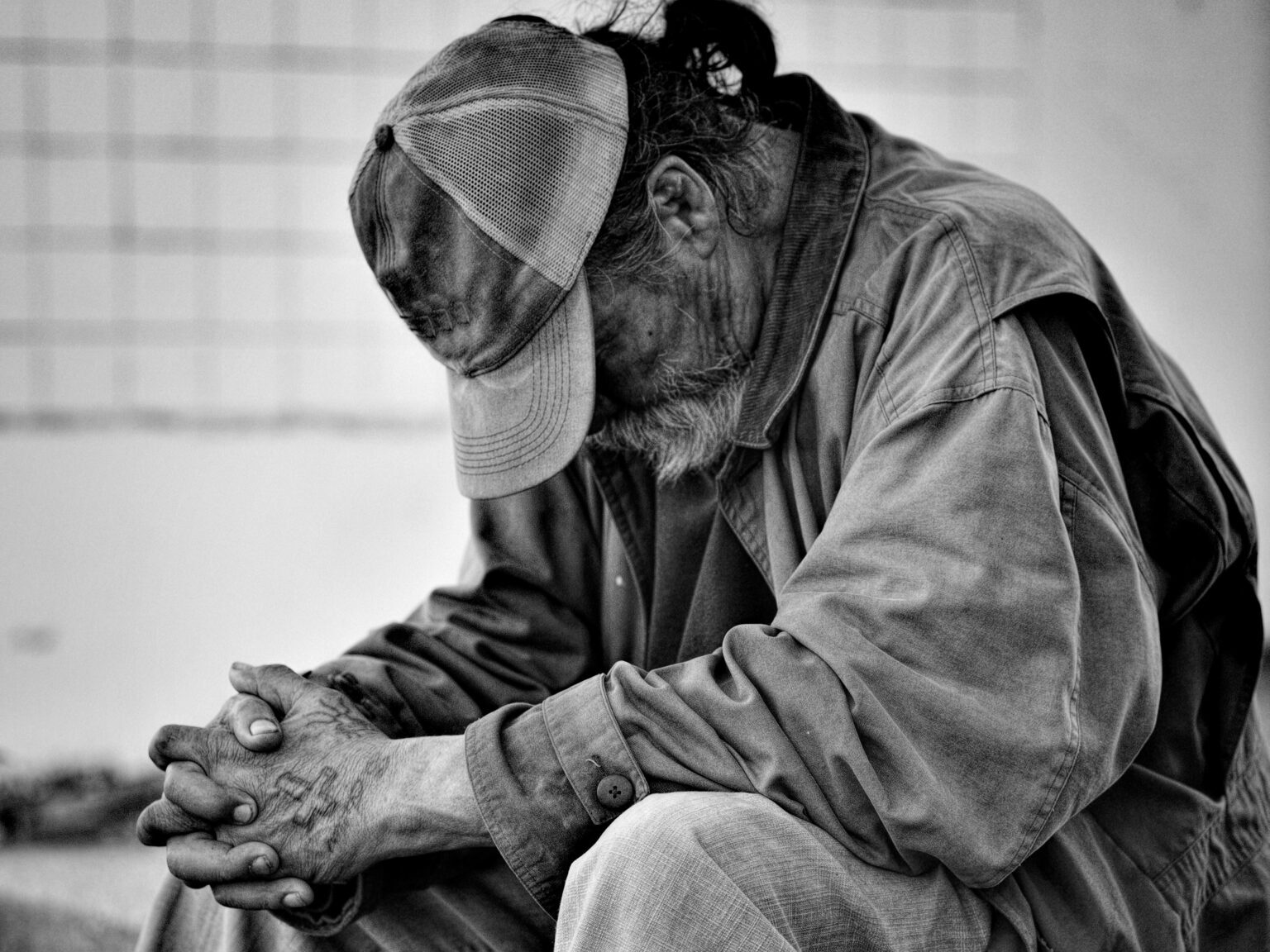Dearest friends,
During the First World War the British government was recruiting volunteers for its killing fields in France. They used guilt to coerce them, like the poster of a man with his son on his knee and the boy asking ‘what did you do during the war, daddy?’ One day, maybe, but without the loaded tone, people will ask us what we did during the first big Shutdown (or maybe it will be ‘Shutdowns’), ‘what was it really like?… And afterwards, was it hard?’ And if a child asks why it was called by CoVid-19 we can say that Co=Corona V=Virus D=disease and 2019 was when it began. But 2020 was when it knocked everyone into the beginning of a new vision of reality. It helped to have a name for it, even if we didn’t know much about it or how to cure it. Maybe it will take us decades to see its meaning. ‘Well,’ we will say wisely, ‘it took us all by surprise and it was something of a mystery’.
As to the question, I would answer, ‘I was in Bonnevaux, locked up in a beautiful prison with a group of very nice people. We were faithful to our existing daily rhythm of life, of prayer, work and study (including meals and the occasional movie) which our ancestor Benedict designed wisely to take us through both good times and bad times. I stopped travelling except through the internet, which was easier than flying but earned no airmiles. Because of the technology of online meetings, I have been busier than usual working with our amazingly dedicated international team as we try to respond to the spiritual needs of our global community and of those who have met us for the first time through the crisis.
In ten days, we made a new website to help people face new challenges (A Spiritual Path through the Crisis) which is run by some of our younger teachers. We have had many meditation sessions online, dialogues with other faiths, intellectually stimulating teachings by a variety of speakers. And we began streaming contemplative mass on

Sundays with a large congregation from across the planet, an online yoga class and live meditations in our daily schedule. Through all this interaction with individuals and national communities, we understood better how Bonnevaux is called to be a physical centre of a community that has no walls or borders, no need for visas, and in which even the barriers of language can melt in the experience of deep silence. So, we were contemplative but busy. Benedict said, ‘idleness is the enemy of the soul’. We have not been idle but we found ourselves more clearly becoming what we kind of already knew we were: a centre of peace that is here to serve as a centre for peace.
The other question our descendants might ask is about meaning. Many are already impatient to know what impact it will have in the world. Will it change how we live, work and respect the environment? It is too soon for answers, but from what Bonnevaux has taught me during these months, let me share some early reflections. I start with a thought of Simone Weil that struck me recently. Every event in life is part of the language with which God speaks to us. All events are signs of God’s love. If you drink a glass of water the water is God’s ‘I love you’ to you. If you are two days in a desert and can find nothing to drink, your thirst is God’s ‘I love you’. As we learn this language at first, we think only some events mean ‘I love you’, the nice, desirable things that happen. But as we learn the language better, we see that the entire language, every event, means ‘I love you’. God has only this one thing to say. God has no way of saying ‘I hate you’.
This isn’t an easy language to learn. But it could not be simpler. Keeping this in mind, struggling with the strange idea that Covid-19 could be a love message, let’s try to reflect on what the message ‘I love you’ might mean.
The Noosphere
Do you remember movies of World War Two that show people huddled round a radio listening intensely to the news? That was the early days of instant global communication. Before that, when major events happened, like wars or epidemics, people only really knew what was going on from what they saw in their towns or villages, the soldiers marching past or people dying. How this connected with news from other places was largely up to rumour, magic and imagination.
Life was local, which had advantages but could also be intensely limiting and oppressive. Now, rich and poor alike, we are all global citizens. Yesterday the BBC World Service had a sound clip of one of the million Rohingya refugees incarcerated in camps in Bangladesh. The first cases of the virus had just been discovered; the prospect of infection spreading through the over-crowded camps is horrific. The man spoke in his Burmese Rohingya dialect but the words ‘Covid-19’ were clearly audible. Evidently, he and we all face the same crisis and we know it and have invented a universal name for it.
Early in the 20th century the Jesuit scientist Teillard de Chardin and the Russian scientist Vladimir Vernansky, coming with different perspectives, developed the idea of the ‘noosphere’. We are so familiar with it in practice today – with 24/7 news, Zoom, Instagram and the worldwide web, that it hardly astonishes us. We live in this cocoon-sphere of consciousness unconsciously. In physical isolation we saw what a lifesaver communication technology was.
The ‘noosphere’ has now become more conscious and we must reflect on the meaning of a new kind of global communication. The Greek word nous means mind, so the noosphere is a ‘sphere of the mind’. The technology behind it may dazzle us or we may get addicted to it, taking our cell phones to bed with us. But this crisis has made us wonder how this new immediacy of communication across space and time-zones affects our way of living together as one huge, multicultural family. The noosphere has emerged from the biosphere – the physical world we share in which viruses spread. But this new sphere is at a higher level of consciousness. As I am writing this at Bonnevaux I am looking out on the lake watching the ducks and herons. If I were closer, I would see the plump, swift fish. If I moved closer, they would feel the threat instantaneously. They would turn on a sixpence, change direction, take flight, rapidly, obedient to each other and all without anyone bumping into another. How could they do this without possessing a common mind? So why not us too? We are conscious; we have more in common than divides us. We can form a football crowd or a meditation community, pack malls as consumers, get addicted to the same soap operas. We do, however, bump into each other a lot but we can work together on ways to improve this. Is our common mind, our noosphere, evolving?
Is the sphere of reason, of conscious mind composed of intricate networks of interpersonal relationships, developing? Is it forming both through the glass of water we drink and the thirst we feel when deprived of it?
The materialist would say all this is simply a product of technology and that mind emerges from complex matter. There is no proof of this, of course, but it is a dogma of modern science. Whatever the cause may be, we are increasingly curious about this new consciousness and its implications. For example, it demands a higher moral responsibility because the risks it poses are as great as the benefits it promises. Fake news can be seeded in it like a virus. Confronted with his wilful stupidity or falsehood, a brazen politician has only to make endless soundbite denials to eventually plant them as a possible truth in the mass mind. This is not the fault of technology. We cannot blame technology – or a virus – for causing distress. They are only causes. It is we who misuse good things for bad ends.
The globalising of human consciousness calls for global institutions. Perhaps a logical consequence of the evolving noosphere will be a globally respected moral authority. If so, we will find conflict ahead. Not surprisingly dictators and dishonest leaders with totalitarian tendencies will oppose and undermine such global bodies by reviving outdated but still toxic nationalisms. In a spiritual analogy, it is the ego resisting the Self.
But this is why it is easier now to speak about spiritual consciousness. Survival depends on it. In contrast to the modern dogma of reductionist materialism, a universal wisdom is reemerging. Rooted in a perennial philosophy it calmly says that mind does not arise from matter, but that matter is manifested by mind. This is not a philosophical abstraction of no practical value. Fundamental ideas shape the world. It seems, for example, that some leaders, responsible for abolishing environmental controls and restarting the exploitation of nonrenewable resources, feel justified by their fundamentalist religious beliefs. They hold extreme biblical views about the seven days of creation and the imminent Armageddon that will precede the Rapture. If an elect group are going to be beamed up soon, what difference does environmental damage make? Or, belief that all human beings do not possess equal, essential value. Some, the more successful, are worth more than others. Rational arguments can then be made for creating collateral damage, sacrificing whoever you feel are less important. It helps to have God on your side in such decisions. Believe in a God who punishes whoever breaks the rules made by His representatives and rewards those who keep them, and religion becomes a tyranny of the self-righteous. The glass of water shows that God loves you and your thirst proves that God hates you.
Covid-19 has shocked us into a new sense of human unity as we watched how a simple, miniscule virus has no favourites and no enemies. Good and bad belong to humans not to events. We have seen how human tragedy can be played for shameful political advantage. Yet we also see a daily outpouring of altruism and tenderness. Both extremes are visible at the click of a mouse. How we interpret it depends on the mind behind the hand controlling the technology. The crisis has shown us we need to fund our healthcare but it also exposes the weakness of our education. Critical thinking developed by good public education opposes a tyranny that tries to prove that oppression is liberty and black is white.

Technology can assist the development of a global mind and of a more just society. It can also be twisted to block both. But what if the common mind, the unity of human consciousness, is on the march and cannot be stopped? What if it manifests at certain stages of evolution, helped but not dependent on technology? An absurd idea to the materialistic mind, but it helps to illustrate the Mind of Christ:
“Let this mind be in you as was also in Christ Jesus “
Phil 2:5
“Now I beseech you by the name of our Lord Jesus Christ, that you all speak the same thing, and that there be no divisions among you; be perfectly joined together in the same mind and in the same judgment. “
1 Cor 1:10
“The Self is One. Ever still, the Self is. Swifter than thought, swifter than the senses. Though motionless he outruns all pursuit. Without the Self, never could life exist “
Isha Upanishad
To feel that we share in this universal mind, at the deepest level of reality described in these words, it is not necessary to try to know everything, to browse the internet all day, read every article, argue about every opinion, become a news junkie. It is necessary only to pay attention to one thing totally. Training our potentially infinite capacity for attention forms the contemplative mind in individuals who then come to see how they are equal sharers in the whole of humanity. The contemplative mind is the birth right of all. Meditation is for everyone. The political benefit of this is that contemplatives are not so easily manipulated or misled; knowing what they belong to makes them participate more responsibly in the democratic process.
The Personal Impact of the Covid-19 Crisis
Many, who did not fall sick or have people who were close to them suffering, will shyly say they enjoyed some aspects of confinement. Even The Personal Impact of the Covid-19 Crisis Contemplative Mass live from Bonnevaux every Sunday. More info here: http://tiny.cc/liveevents Meditatio Newsletter May 2020 www.wccm.org 5 with anxieties about work or finances, they followed a balanced daily schedule of exercise, reading, meditating, chatting online, doing things they liked at home like baking or painting. They often felt relieved not to be rushing all day, commuting, jumping on and off planes or trains, shopping. Even though they also missed hugs and kisses they benefited by this time of slower living. Others, however, with tendencies to depression or issues like anger or addiction have found it excruciating. It brought the dark side to the fore and subjected them to much suffering. Everyone has learned something more about themselves. Some may even apply the self-knowledge they have gained to rebuild a healthier lifestyle.
Confinement, enforced stability and simplicity, confront us with our capacity to be simply content with what we have. Many political prisoners like Gandhi, Solzhenitsyn and Mandela attest to this. Monastic life builds degrees of solitude into its programme of spiritual development. Spirituality – however one defines it – begins with the often lonely work of accepting what is. Denial, resistance, rage or violence do not change reality to match our preferences. Eventually reality wins. It teaches us and we have to obey what is. Only then can we do good work for others. Until then, our efforts to change things are largely projections of fantasy. And so, at this basic level of accepting life itself as a spiritual journey, the crisis has been an awakening for many. Confinement and loss have been a deeper call to acceptance, self-knowledge and a spirit of service.
The frustration of normal habits and desires led many to realise how to control anger, handle restlessness, acknowledge our addiction to distraction, expose our evasions, selfdeceptions and our tendency always to blame others. It has been a desert experience – of more than forty days and is not fully over yet. Perhaps we glimpsed how our hunger for distraction, novelty and stimulation contradicts our innate hunger for God. This is true even if we do not have the word God in our vocabulary of meaning. God is present and we thirst for union with God, named or unnamed, invoked or not. Spiritual hunger is our most intimate longing, the reality check of all the distorted compensatory desires we pursue. It is also the great unifying bond between us all. If beauty, love, compassion, and justice unite us across all differences, at the heart of them is the thirsty hunger for God. It is the great privilege of the human condition to feel it. If we accept it for what it is, it contains its own fulfilment.
The deepest self-knowledge is not psychological awareness of our formative experiences and conditioned patterns of mind. Important though this is, the essential self-knowledge that effects permanent transformation and liberation, is not found in our thoughts, memories or imagination. It arises from a direct encounter with our being, at its source, in utter stillness and silence. This may sound like an experience for the few but it is much closer to us than we think and more universally accessible. Sometimes suffering pushes us into this space when our efforts to find it have failed. The self-knowledge it brings is the greatest asset we have in our quest to be happy and free. It may come as the glass of water or as the thirst. It simply is. Knowing it once will forever change the way we cope with the swings of fortune that previously controlled and dominated us.
Humans are a mass of paradox. We belong to one human family. What happens anywhere on our home planet influences each of us. But we are also locals embedded in the physical and cultural conditions of our home and immediate companions. We are also solitary in the sense of being unique and unrepeatable. And we are all ordinary, too, however high we have risen or low we have fallen. We all need attention and love, even the hermit. Accepting this paradoxical ordinariness exposes our hidden glory and real value. This is the outcome, the humility of meditation. When they meditate the most intelligent, powerful or famous meet the same challenges as everyone else. Accepting our ordinariness and limitations unexpectedly becomes a strength and source of encouragement. Solitude then expands into communion. Experiencing equality, fraternity and liberty of spirit we begin to function maturely in community.
The crisis of the past months can teach us these essential lessons of life when it is understood as a spiritual journey. In confinement many people decided to learn something new, to restart a long-abandoned task, to be creative. It is vital to develop, until the end, to risk learning new things and change old habits. As we are enduring it now, disruption of life feels cruel. But it may also be a kind teacher and catalyst for change. Hard times have taught many already that they really can change: their sense of self Accepting our ordinariness and limitations unexpectedly becomes a strength 6 www.wccm.org Meditatio Newsletter May 2020 and their character traits can be repaired. It is never too late to be have a conversion of heart. In the most challenging conditions, we are capable of transformation. Brain scientists say that plasticity is with us till the end. If we believe the Christian mystics, it continues even after the end, because in eternity we are transformed ‘from glory to glory’. Limitations accepted push back the walls confining us. Weaknesses become sources of strength, of grace from God.
If this is true of us at the personal level, might it not be equally true for our communities, the church, our national and global institutions?
Serpents and doves
When we pay attention to one thing, other than our self or what concerns our self-interest, we become a foot soldier in the contemplative revolution. All the spiritual teachers of humanity have seen and shown this. But to build a contemplative practice into life means to work continuously, humbly to come to an ever-purer degree of attention. At its fullest, purity of attention is the Mind of Christ.
The trick is not to see this as a heroic task but as a simple and ordinary one. Of course, it has an element of the hero’s quest but heroes are never as heroic as they are portrayed and the real heroes know it. To meditate is not to be heroic but to be a disciple. This is a less flattering designation for the ego, so we resist discipleship; but dealing with the resistance leads to self-knowledge which makes us humble and more useful to others. This moment is always a crossroad in our personal journey. It returns periodically. If we make the right turn, we grow beyond anything we can imagine, by becoming the person we exist to become.
Is this also the crossroad where humanity finds itself now? The heroic path – mastering and exploiting the earth till its ecological balance collapses; embracing the hyper-individualism of the warrior pursuing glory and ambition in politics and business even when hiding behind Green camouflage; viewing the poor and powerless as cannon fodder for the march of a jungle deviant of capitalism; fuelling greed (the illusion that we can have everything) with gluttony (the attempt to stuff ourselves with everything); losing faith in the existence of truth because we have sold our soul to falsehood. We have felt this for some time.
We have also felt that a crisis was bound to come one way or another – through a financial collapse, a major environmental tipping point, a political collapse into totalitarianism. This may be only the first of a series of crises that awakens us to the failure of our outdated view of civilisation. But it may also trigger a new vision of reality. Individually we have to surrender egoism, collectively we need to sacrifice nationalism.
Personally, we need to rediscover poverty of spirit. Economically we need to let go of possessiveness and share. Meditation guides us to moderation. Materially, we need to reduce and simplify. The values of contemplative consciousness and the new world order are aligned.
The more radical the spirit of revolution, the less force it will use. The contemplative revolution uses no force. It does not market itself. Its leaders know they are flawed and admit it. Jesus said that to advance the reign of God people would need to be as cunning as serpents and as simple as doves. It’s a hard combination. It seems unlikely to succeed. But then success isn’t what it’s about. It’s a strange goal and a weird time. But stranger things have happened. After all, as I write it is still the Paschal season which recalls a very strange event and time indeed. And Ordinary Time means travelling as if we have arrived.
With much love,






